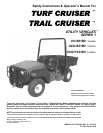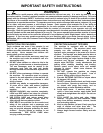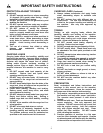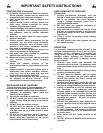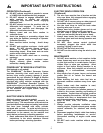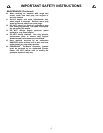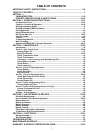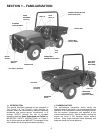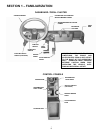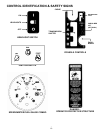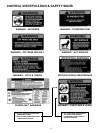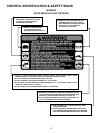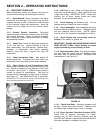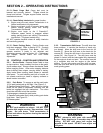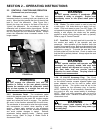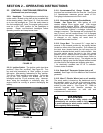
4
IMPORTANT SAFETY INSTRUCTIONS
PREPARATION (Continued)
4. Be familiar with the area in which the machine
will be operated. Inspect area for objects and
hazards that could cause loss of control.
5. Keep people and pets clear of machine and
work area.
6. Inspect shields, guards, switches, brakes and
other safety devices frequently for proper
operation and keep them in place.
7. Inspect headlights and repair as required before
operating machine. Keep headlight lenses and
rear reflectors clean to provide maximum
visibility.
8. Make sure all safety signs are clearly legible.
Replace if damaged.
9. Protect yourself; dress appropriately for the
conditions and the work being performed.
Protective equipment, such as helmet, safety
glasses or face shield, substantial footwear,
long pants, is recommended.
10. Know how to STOP the machine quickly and
safely in preparation for emergencies.
11. Use extra care when loading or unloading
machine into a truck or trailer.
12. Make sure accelerator, brake, steering, and shift
lever function properly before operating
machine.
13. Adjust tire inflation pressure to the
specifications listed on the machine and in this
manual.
14. Inspect condition of tires and replace worn or
deteriorated tires before operating machine,
using only tires of the same size, type and
construction approved by SNAPPER.
15. Obey all local ordinances and laws governing
the operation of off-road vehicles. Drive
responsibly and respect private property.
SAFE HANDLING OF GASOLINE
To avoid personal injury or property damage, use
extreme care in handling gasoline. Gasoline is
extremely flammable and the vapors are explosive
1. Extinguish all cigarettes, cigars, pipes and
other sources of ignition.
2. Use only an approved fuel container.
3. DO NOT remove fuel cap or add fuel with the
engine running. Allow the engine to cool before
refueling.
4. DO NOT refuel the machine indoors.
5. DO NOT store the machine or fuel container
inside where there is an open flame, spark or
pilot light such as on a water heater or other
appliances.
6. DO NOT fill fuel containers inside a vehicle or
on a truck or trailer bed with a plastic liner.
Always place the containers on the ground
away from the vehicle before filling.
SAFE HANDLING OF GASOLINE
(Continued)
7. Remove gas-powered equipment from the
vehicle or trailer and refuel it on the ground. If
this is not possible, then refuel equipment
using a portable container, rather than a
gasoline dispenser nozzle.
8. DO NOT start gas powered equipment in
enclosed vehicles or trailers.
9. Keep the nozzle in contact with the rim of the
fuel tank or container opening at all times until
fueling is complete. DO NOT use a nozzle lock-
open device
10. If fuel is spilled on clothing, change clothing
immediately.
11. DO NOT overfill a fuel tank. Replace fuel cap
and tighten securely.
OPERATION
It is extremely important that the operator of this
machine understand that it is not a toy, an ATV or
recreation vehicle. Engaging in horseplay, joy
riding, racing, jumping, hill climbing and similar
activities greatly increases the likelihood of
accidents, which may result in damage, serious
injury and death.
1. Operator must mount and dismount the
machine from the left side. The passenger must
mount and dismount the machine from the right
side.
2. DO NOT attempt to start engine unless properly
seated in the operator’s seat.
3. DO NOT leave the machine with the engine
running. Stop engine, set park brake, shift to
neutral and remove key before leaving the
machine for any reason.
4. Operator must be properly seated with the seat
belt buckle securely latched and the seat belt
adjusted to a snug fit before operating machine.
5. Seating is restricted to only one operator and
one passenger. The passenger must be
properly seated in the passenger seat with the
seat belt buckle securely latched and the seat
belt adjusted to a snug fit before starting and
operating the machine. DO NOT carry more
than one passenger.
6. DO NOT shift transmission when machine is in
motion. Machine must be fully stopped before
shifting.
7. DO NOT operate machine on or near highways
or public roadways. This machine is designed
for off-road use only and is not licensed for use
on public roads.
8. Keep hands and feet inside machine at all
times.
9. DO NOT stand up in machine while machine is
in motion.
4



